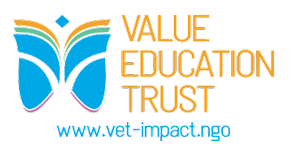Cause Area
Primary Sectors
Secondary Sectors
Financials
-
2021
Total IncomeRs.53,840Total ExpensesRs.193,908Tip: Click on any value above to exclude it. -
2022
Total IncomeRs.630,562Total ExpensesRs.486,755Tip: Click on any value above to exclude it. -
2023
Total IncomeRs.307,434Total ExpensesRs.339,876Tip: Click on any value above to exclude it. -
2024
Total IncomeRs.439,921Total ExpensesRs.342,637Non Program ExpensesRs.58,403Program ExpensesRs.254,949Tip: Click on any value above to exclude it.
Geographies Served
Programs
-
4 line
District
Ernakulam
Thiruvananthapuram
States
Kerala
4 line is a four-year after-school programme to improve the learning outcomes of marginalised children of grades 5 to 8. Currently, we are collaborating with 6 schools, equipping 18 teachers to train 260 children.
Our Approach
1. Identification & Assessment
We select a government-funded school with marginalised students and engage in a 6-month process to assess needs.
2. Child Selection & Teacher Training
We select grade 5 children after verifying their eligibility. We also select school teachers and train them as certified instructors.
3. The 4-year delivery
In the first year, we strengthen children's basic numeracy and enhance their learning abilities. In the next two years, we concentrate on improving their math skills. We also help develop their personal and professional skills like communication and time management. Our program also includes character education. We ensure parental involvement through counselling sessions and child performance reviews. -
NumberWiz
District
Thiruvananthapuram
States
Kerala
NumberWiz is a two-year subset of the 4 line programme to build a strong foundation in Mathematics for marginalised children in grades 5 and 6. Currently, we are collaborating with 4 schools, equipping 14 teachers to train 190 children. The NumberWiz programme spans 4 levels.
Level 1: Introduction to Abacus (7 months)
The children build their foundational numeracy skills.Level 2: Introduction to Mental Arithmetic (4 months)
The children do basic mental additions and subtractions and master 2-digit by 1-digit multiplication using the abacus tool.Level 3: Advanced Mental Calculations (4 months)
The children perform advanced mental additions and subtractions, master 2-digit by 1-digit mental multiplication, work with decimal numbers and do simple divisions using the abacus tool.Level 4: Beyond Arithmetic (5 months)
The children master advanced mental additions and subtractions of decimal numbers, do advanced mental multiplication and division, and solve applied arithmetic problems.
Impact Metrics
-
Percentage of Children Who Score a Minimum of 40% in Maths in the Grade 5 Final Exam
Program Name
NumberWiz
Year-wise Metrics- 2022-23 54
- 2023-24 89
-
Percentage of Children Who Score a Minimum Aggregate of 50% in All Subjects in the Grade 6 Final Exam
Program Name
NumberWiz
Year-wise Metrics- 2022-23 41
- 2023-24 63
Leadership Team
Demographics & Structure
-
Organisation Strength
None
Registration Details
-
PAN Card
AAATV1873E
-
Registration Number
426/92
-
CSR Form 1
CSR00038331
-
80G
AAATV1873EF20226
-
12A
AAATV1873EE20210
-
FCRA
Not Available
About
-
Headquarters
Tiruvalla, Kerala
-
Since
1992
Impact
Reflecting on Amala's educational journey, her academic scores have impressively improved after 18 months of dedicated training. By the end of the third term in sixth grade, her results had significantly increased across all subjects: from 36% to 53% in Mathematics, 43% to 45% in General Science, 53% to 83% in Social Science, and a remarkable leap from 28% to 92% in English. This marks an overall improvement of 28%. Amala's class teacher has observed notable enhancements not only in her academic performance but also in her confident engagement with school extracurricular activities. Amala, in her own words, with her newfound enthusiasm for learning, says, "Mathematics now feels more intuitive, and my overall confidence has soared. The brain exercises from the Abacus classes have sharpened my focus, allowing me to solve problems visually without needing physical tools. Additionally, the character education sessions have reinforced my belief that with hard work, I can achieve anything—a principle I am eager to apply in all my endeavours." Amala’s mother also expresses her delight over Amala's progress: "Amala's initial performance in fifth grade was concerning, especially in Math, where she failed. However, since joining the project, there's been a tremendous improvement in her grades, and she's also become very active in school events, often taking on coordinating roles." The progress extends beyond Amala, touching all 30 children in our pilot program. Over 18 months, their scores have improved from 40% to 53% in Math, 34% to 50% in General Science, 45% to 63% in Social Science, and 45% to 60% in English, culminating in an overall enhancement of 16%. The Headmistress of St. Thomas GHS, Ernakulam, where we conduct our pilot program, applauds the initiative: "Value Education Trust's provision of free abacus classes has been transformative. It has not only boosted the children’s numerical abilities but has also significantly enhanced their character development. Previously disengaged students have become more attentive and focused across all subjects. They have also shown improved behaviour and social skills. The project's impact is particularly evident among our fifth and sixth graders."
Vision and Mission
Political & Religious Declarations
-
Political Affiliation
-
Religious Affiliation
Location
-
Headquarters
Building No.: 10/24, Bethel Cottage, Amalloor, Manjadi P O, Tiruvalla – 689105, Kerala, India
Directions, Tiruvalla, Kerala -
Offices in Cities
Ernakulam, Thiruvalla, Thiruvanathapuram
Other Details
-
Type
Non-profit
-
Sub Type
Trust
Website
Technology Adoption
-
SOC 2 Compliant
No
-
Financial Management
-
Beneficiary Management



